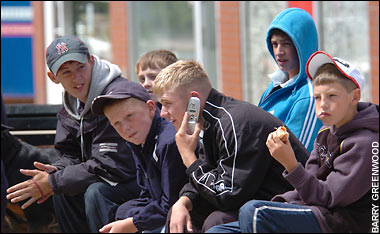Disaffected British youth: Unicef says youngsters are better offoverall in every other industrialised country included in their report
Britain has been ranked bottom out of 21 countries in a United Nations assessment of children's well-being.
The nation's high number of single parents and step-families has contributed to the ranking.
The scathing report by the UN children's fund, Unicef, says youngsters are better off overall in every other industrialised country, including less wealthy nations such as Poland and the Czech Republic.
It says there is statistical evidence to link growing up in single-parent families and step-families with a greater risk of dropping out of school, leaving home early, poorer health, low skills, and low pay.
Of 7.3 million families with parents of working age in Britain, a quarter are lone parents. The nation has far more single-parent families than any other EU nation.
It is predicted that by 2010 there will be more children living in a step-family than in their biological family.
According to today's report, the UK lags in other areas too such as the number of children living in relative poverty, vaccination rates, and the time spent talking, or eating with a parent or parents.It also has high rates of obesity, drunkenness, bullying, early sexual intercourse, cannabis-taking and teenage pregnancy.
Britain was rated higher for education, but languished in the bottom third for each of the other measures, giving it an overall placing at the bottom, along with the US.
The report was published by the fund's Florence-based Innocenti Research Centre before a national inquiry into the state of childhood, chaired by the Government's unofficial "happiness" tsar Lord Layard.
Drawing on 40 separate indicators, it attempts to measure and compare child well-being in six areas: material well-being, health and safety, education, peer and family relationships, behaviours and risks, and young people's own subjective sense of well-being. Bob Reitemeier, the chief executive of The Children's Society, a charity, said today: "We cannot ignore these shocking findings. Unicef's report is a wake-up call to the fact that, despite being a rich country, the UK is failing children and young people in a number of crucial ways."
Anastasia de Waal, the head of family and education at the think-tank Civitas, said: "That we rank so poorly as a rich welfare state is an indictment of Government policy. Underlying our poor record are serious social problems that New Labour isn't addressing."
Prof Sir Albert Aynsley-Green, the Children's Commissioner for England, said: "The findings are disheartening but not surprising as they echo what children tell me on a daily basis."
The shadow chancellor, George Osborne, said: "This report tells the truth about Gordon's Brown's Britain."
But the report is bound to be controversial because of some of the ways "well-being" is measured.
For example, the UK rates poorly on relative poverty because some incomes in Britain fall far below the incomes of others in the UK.
Likewise, well-being is measured in terms of how many children live with both parents.
Lone parent organisations argue that there is no evidence that all children with one parent are bound to turn out worse off in adult life than children of traditional family units.
Relationships
Top: Italy
Bottom: Britain
Overall, about 80 per cent of children in the countries under review live with both parents, from 90 per cent in Italy to less than 70 per cent in Britain. Fewer than 50 per cent of UK children say their peers are "kind and helpful" compared with 80 per cent in Portugal.
Behaviour
Top: Sweden
Bottom: Britain
Fewer than 15 per cent of young people report being drunk on two or more occasions. But in Britain this rises to almost a third. The number of young people who admitted using cannabis varied from five per cent in Sweden to more than 35 per cent in Britain, Canada and Switzerland.
Self-esteem
Top: Netherlands
Bottom: Britain
Children's sense of well-being — whether they were positive or negative about life — was higher in the Netherlands, Spain and Greece and lower in Poland and Britain. Girls reported lower levels of health than boys. This difference gradually increases with age.
By Sarah Womack
Source: The Telegraph


No comments:
Post a Comment